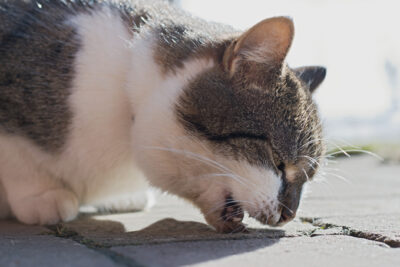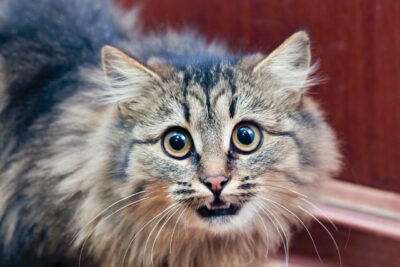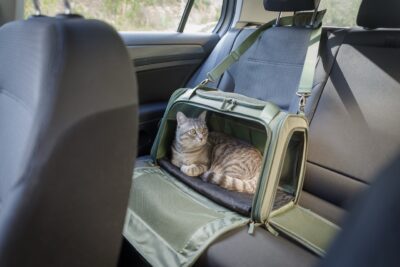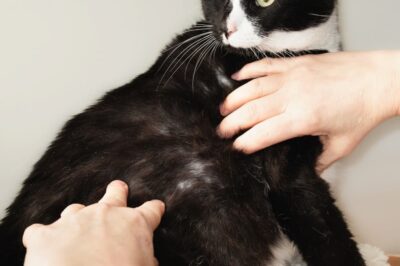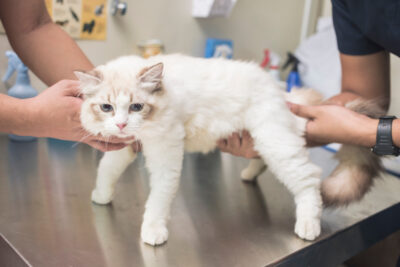Cat Burping: What’s Normal and What’s Not

The mental image of a cat burping may be a bit funny and maybe a bit jarring. After all, we tend to think of cats as neat and dainty little pets, in contrast to their raucous, rowdy, belching canine siblings. However, if you think you hear your cat burping, you may find yourself quickly asking yourself, “can cats burp?”
Read on to learn more about the potential for burping in cats.
Do Cats Burp?
Like both humans and dogs, cats can burp. Unlike humans and dogs, however, burping in cats is relatively uncommon.
The occasional cat belch doesn’t necessarily mean there is something wrong with your cat. However, repeated burping in a cat may suggest an underlying medical condition. If you see your cat burp, pay attention to decide whether it’s an isolated incident or a new pattern that calls for investigation.
What Does a Cat Burp Sound Like?
Cat burps may vary in sound, ranging from incredibly soft to a more moderate volume. You are very unlikely to hear a loud belch from a cat, like you might hear from a person. In fact, cat burps are often nearly silent. In some cases, a burp may sound like a soft growl or meow.
Cat burps can sometimes be confused with regurgitation because both involve bringing something up from the stomach (burp) or esophagus (regurgitation) into the mouth relatively effortlessly. As you might suspect, the difference between burping and regurgitation is relatively small. Regurgitation primarily involves bringing up undigested food or fluid, but it may also hold a small amount of gas. Burping primarily involves gas, but it may also have a bit of fluid. If your cat swallows right after burping or regurgitating, it can be hard to know whether they brought up gas, fluid, or both.
Burping can also be difficult to distinguish from hiccups in cats. Hiccups are often repetitive, while burping is often an isolated incident. Even so, a single hiccup can occur, and a burp may look like a single hiccup.
If you’re unsure whether your cat is burping or doing something else, try to take a brief video. Watching this video may help your veterinarian determine whether your cat is burping or having some other sort of episode. Additionally, take note of when your cat tends to burp. For example, is your cat burping after eating? If so, this would be helpful information to report to your veterinarian.
Why Is My Cat Burping?
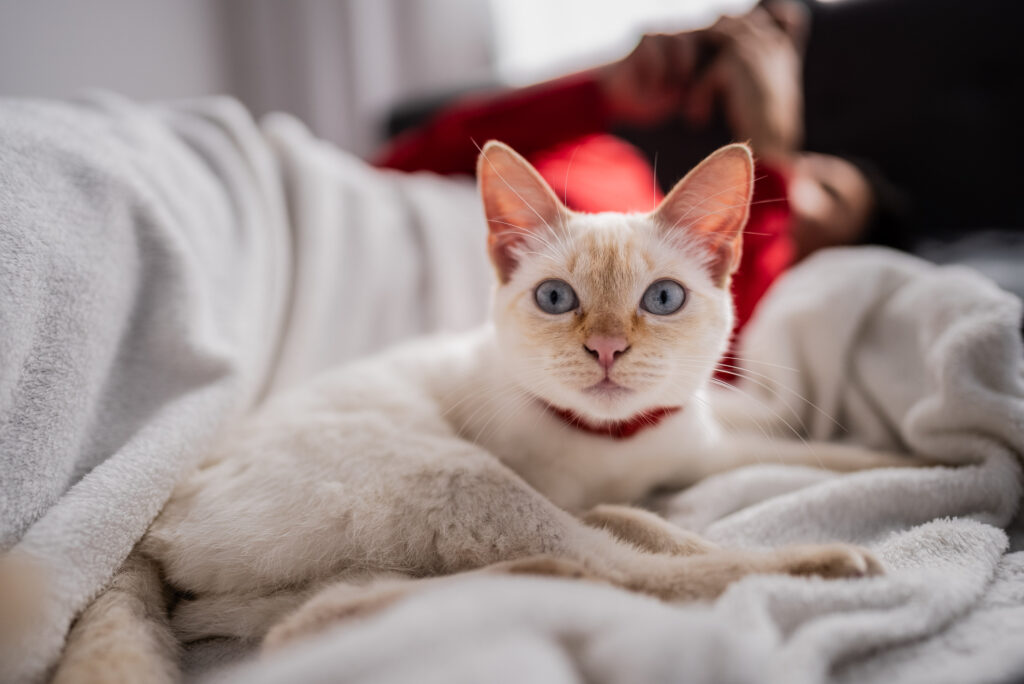
Burping is caused by gas accumulation in the stomach. This can happen when a cat swallows gas, when gas is produced inside the stomach or intestines, or when other conditions lead to abnormal gas accumulation.
While there are many conditions that can contribute to cat burping, here are some common examples:
Rapid eating
When cats eat their food rapidly, they are more likely to swallow air with their food. If your cat burps after eating, rapid eating may be to blame. Some cats tend to eat very quickly, and this is especially common in cats who are fed a single, large daily meal. Cats in multi-cat homes may also tend to eat quickly, out of a desire to eat as much as possible before their housemates eat the food.
Diet
A diet’s nutritional composition can have an impact on gas formation. Diets that are high in fiber, for example, help to nourish healthy bacteria in the intestines. However, these bacteria may produce gas in the intestines; an increase in bacteria can lead to increased burping. If burping increases after a diet change, dietary factors may be to blame. Avoid frequent dietary changes and focus on finding a high-quality diet that works well for your cat.
Gastrointestinal diseases
Gastrointestinal (GI) conditions like food allergies, inflammatory bowel disease, and GI tumors can alter GI function, leading to an increase in burping.
Infectious diseases
Bacterial or parasitic infections lead to changes in gas production and changes in intestinal contractions, leading to increased burping.
Foreign body
A foreign object in the stomach or intestines, such as a string or hair tie, can affect GI function and lead to an increase in burping.
Medications
Some feline medications affect GI function, which may lead to an increase in burping.
This list is not exhaustive. A variety of conditions that affect your cat’s intestines and/or their overall health may contribute to increased burping.
Cat Burping: When to Be Concerned
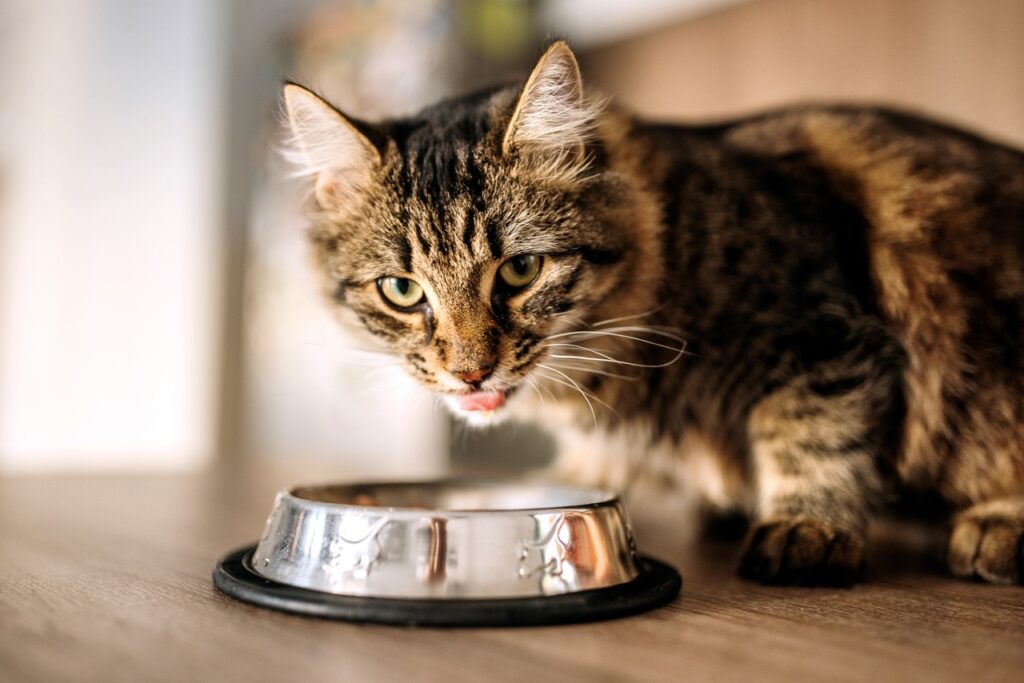
An occasional burp is probably nothing to fret over. However, if you suddenly notice your cat burping a lot or notice a change in the severity of your cat’s burping, that can suggest a problem.
If your cat suddenly begins burping on a regular basis, and this is a new behavior for them, you should schedule a veterinary visit within the next few days. If your cat’s burps are accompanied by a foul odor, this also calls for a veterinary exam as soon as possible. A foul odor may come from dental disease, but it can also suggest changes within the stomach or intestines.
If your cat begins burping suddenly and the burping is accompanied by vomiting, this could be an emergency. Other indicators of an emergency include abdominal pain, lethargy, weakness, or difficulty breathing. If you see these signs, seek veterinary care as soon as possible. In some cases, your veterinarian may be able to get your cat in for an emergency evaluation if you call during your veterinarian’s regular business hours. You may be referred to an emergency veterinary hospital if the emergency occurs outside of normal business hours or if your veterinarian does not have any available appointments.
How to Prevent Burping in Cats
Fortunately, most cats will go their entire lives without any noticeable or problematic burping. However, there are some steps you can take to reduce your cat’s likelihood of burping.
Consider the following:
- Feed your cat a high-quality, well-balanced diet intended for cats of their life stage.
- Avoid frequent changes in your cat’s diet. If you must change your cat’s food, do so gradually over a period of one week.
- Limit treats and table food.
- Keep your cat indoors to prevent hunting and reduce their risk for infectious diseases.
- Prevent your cat from “scarfing down” large amounts of food at one time.
- Feed small, frequent meals.
- Use a puzzle feeder to slow down mealtimes.
- If you have multiple cats in your home, feed them separately to reduce competition for food.
- See your veterinarian regularly for regular veterinary checkups.
- Ensure that your cat stays up to date on all recommended vaccines.
- Give year-round parasite control as recommended by your veterinarian to reduce the likelihood of intestinal worms.
If your cat is burping or experiencing any other GI concerns, contact your veterinarian for guidance.
